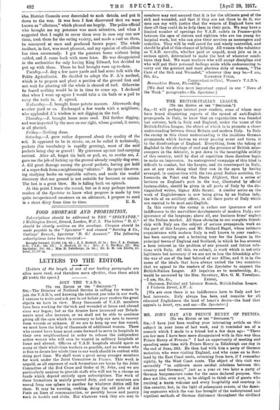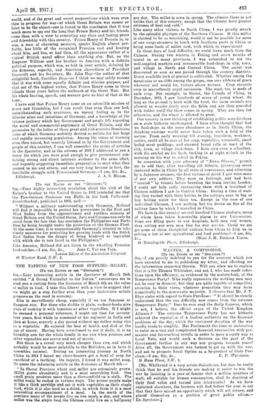MR. JOHN HAY AND PRINCE HENRY OF PRUSSIA. [To mg
EDITOR Or THE " BrEcTATos.") Brit,—I have just been reading your interesting article OR this subject in your issue of last week, and it reminded ma of a. remark which I made to a friend but a few days ago : "There are few men I have been more disappointed with in this war- than Prince Henry of Prussia." I had an opportunity of meeting and spending seine time with Prince Henry in Edinburgh one day in the end of June, 1911. He then had with him a party of German motorists who were visiting England, and who came on to Scot- land by the East Coast route, returning from here, if I remember rightly, by the West Coast route. The object of this visit was ostensibly "to cultivate more cordial relations between this country and Germany," just as a year or two later a party of German burgomasters came for the same declared purpose. One does not like, even now, to be obligeff to think evil of guests who received a warm welcgme and every hospitality and courtesy in this country, but, in the light of subsequent events, of the damn- ing. exposures which the war has brought of the underground and repellent methods of German diplomacy throughout the civilized
world, and of the great and secret preparations which were even then in progress for war—of which Great Britain was sooner or later to be the object—one is forced to the conclusion that it was much more to spy out the land that Prince Henry and his friends came than with a view to cementing any close and lasting peace and friendship with this country. Prince Henry of Prussia is, or was, a man of charming manners, speaks English almost per- fectly, has little of the recognized Prussian cast and bearing about him, and has, or had then, all the appearance rather of a typical British naval officer than anything else. But, as the Emperor William sent his brother to America with a definite political purpose, which was, as told in your article, defeated by the firmness, sagacity, and American shrewdness of President Roosevelt and his Secretary, Mr. John Hay—the author of that delightful book, Castilian Days—so I think we may safely assume that it was with some equally definite and ulterior purpose, and that not Of the highest virtue, that Prince Henry came to these islands three years before tho outbreak of the Great War. But his whole bearing, speech, and manner gave no hint of that at the time.
I have said that Prince Henry came on an ostensible mission of peace and friendship, but I can recall that even then one had, notwithstanding such overtures, an uneasy feeling as to the ulterior aims and intentions of Germany, and a knowledge of the intense jealousy which her Government and people felt regarding the naval and commercial supremacy of Great Britain, and the possession by the latter of those great and rich overseas Dominions eome of which Germany ardently desired as outlets for her large and rapidly increasing population. Among the voices of warning even then raised, but scarcely listened to by the Government and people of this country, I can well remember the series of articles in the Spectator, and in the autumn of 1908 I addressed to you a letter (to which you were good enough to give prominence) con- taining strong and direct intrinsic evidence to the same effect, and urgently suggesting immediate preparation to meet what then seemed to me and others, and ere very long became in fact, the inevitable struggle with Prussianized Germany.—I am, Sir, &c.,



































 Previous page
Previous page